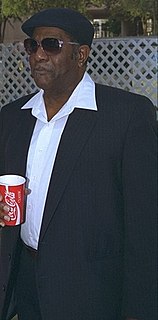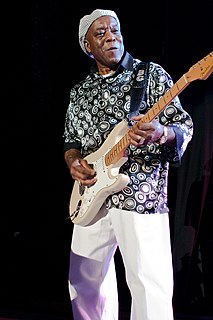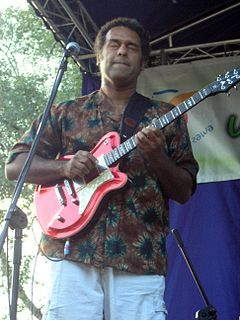Blues is a music genre and musical form which was originated in the Deep South of the United States around the 1860s by African-Americans from roots in African-American work songs and spirituals. Blues incorporated spirituals, work songs, field hollers, shouts, chants, and rhymed simple narrative ballads. The blues form, ubiquitous in jazz, rhythm and blues and rock and roll, is characterized by the call-and-response pattern, the blues scale and specific chord progressions, of which the twelve-bar blues is the most common. Blue notes, usually thirds, fifths or sevenths flattened in pitch are also an essential part of the sound. Blues shuffles or walking bass reinforce the trance-like rhythm and form a repetitive effect known as the groove.

A supergroup is a musical group whose members are already successful as solo artists or as part of other successful groups or well known in other musical professions. The term can sometimes also be applied to a group that has no specific preferred genre. The term is usually used in the context of rock and pop music, but it has occasionally been applied to other musical genres. For example, The Three Tenors—composed of opera superstars José Carreras, Plácido Domingo, and Luciano Pavarotti—have been called a supergroup.

Johnnie Clyde Johnson was an American pianist who played jazz, blues and rock and roll. His work with Chuck Berry led to his induction into the Rock and Roll Hall of Fame. He was posthumously awarded the Congressional Gold Medal for breaking racial barriers in the military, as he was a Montford Point Marine - where the African-American unit endured racism and inspired social change while integrating the previously all-white Marine Corps during World War II.

Aaron Thibeaux "T-Bone" Walker was an American blues musician, composer, songwriter and multi-instrumentalist, who was a pioneer and innovator of the jump blues and electric blues sound. In 2018 Rolling Stone magazine ranked him number 67 on its list of "The 100 Greatest Guitarists of All Time". In March 1975, Walker died due to health issues in his Los Angeles home.

Howlin' Wolf was a Chicago blues singer, guitarist, and harmonica player. Originally from Mississippi, he moved to Chicago in adulthood and became successful, forming a professional rivalry with fellow bluesman Muddy Waters. With a booming voice and imposing physical presence, he is one of the best-known Chicago blues artists.
Chicago blues is a form of blues music developed in Chicago, Illinois. It is based on earlier blues idioms, such as Delta blues, but performed in an urban style.
Electric blues refers to any type of blues music distinguished by the use of electric amplification for musical instruments. The guitar was the first instrument to be popularly amplified and used by early pioneers T-Bone Walker in the late 1930s and John Lee Hooker and Muddy Waters in the 1940s. Their styles developed into West Coast blues, Detroit blues, and post-World War II Chicago blues, which differed from earlier, predominantly acoustic-style blues. By the early 1950s, Little Walter was a featured soloist on blues harmonica using a small hand-held microphone fed into a guitar amplifier. Although it took a little longer, the electric bass guitar gradually replaced the stand-up bass by the early 1960s. Electric organs and especially keyboards later became widely used in electric blues.
British blues is a form of music derived from American blues that originated in the late 1950s, and reached its height of mainstream popularity in the 1960s. In Britain, it developed a distinctive and influential style dominated by electric guitar and made international stars of several proponents of the genre including The Rolling Stones, The Animals, Eric Clapton, Fleetwood Mac and Led Zeppelin.
Lester Franklin Melrose was a talent scout who was one of the first American producers of Chicago blues records.

Otis Spann was an American blues musician, whom many consider to be the leading postwar Chicago blues pianist.
Alabama has played a central role in the development of both blues and country music. Appalachian folk music, fiddle music, gospel, spirituals, and polka have had local scenes in parts of Alabama. The Tuskegee Institute's School of Music, especially the Tuskegee Choir, is an internationally renowned institution. There are three major modern orchestras, the Mobile Symphony, the Alabama Symphony Orchestra and the Huntsville Symphony Orchestra; the last is the oldest continuously operating professional orchestra in the state, giving its first performance in 1955.

George "Buddy" Guy is an American blues guitarist and singer. He is an exponent of Chicago blues who has influenced generations of guitarists including Eric Clapton, Jimi Hendrix, Jimmy Page, Keith Richards, Stevie Ray Vaughan, Jeff Beck, Gary Clark Jr. and John Mayer. In the 1960s, Guy played with Muddy Waters as a session guitarist at Chess Records and began a musical partnership with blues harp virtuoso Junior Wells.
Blues rock is a fusion music genre that combines elements of blues and rock music. It is mostly an electric ensemble-style music with instrumentation similar to electric blues and rock. From its beginnings in the early to mid-1960s, blues rock has gone through several stylistic shifts and along the way it inspired and influenced hard rock, Southern rock, and early heavy metal.

Freddie King was an American blues guitarist, singer and songwriter. He is considered one of the "Three Kings of the Blues Guitar". Mostly known for his soulful and powerful voice and distinctive guitar playing, King had a major influence on electric blues music and on many later blues guitarists.

Luther Allison was an American blues guitarist. He was born in Widener, Arkansas, although some accounts suggest his actual place of birth was Mayflower, Arkansas. Allison was interested in music as a child and during the late 1940s he toured in a family gospel group called The Southern Travellers. He moved with his family to Chicago in 1951 and attended Farragut High School where he was classmates with Muddy Waters' son. He taught himself guitar and began listening to blues extensively. Three years later he dropped out of school and began hanging around outside blues nightclubs with the hopes of being invited to perform. Allison played with the bands of Howlin' Wolf and Freddie King, taking over King's band when King toured nationally. He worked with Jimmy Dawkins, Magic Sam and Otis Rush, and also backed James Cotton.

Jean-Paul Etienne Bourelly is an American guitarist whose music crosses the boundaries of jazz fusion and rock.
British rhythm and blues was a musical movement that developed in the United Kingdom between the late 1950s and the early 1960s, and reached a peak in the mid-1960s. It overlapped with, but was distinct from, the broader British beat and more purist British blues scenes, attempting to emulate the music of American blues and rock and roll pioneers, such as Muddy Waters and Howlin' Wolf, Chuck Berry and Bo Diddley. It often placed greater emphasis on guitars and was often played with greater energy.
This topic covers notable events and articles related to 2010 in music.
This topic covers notable events and articles related to 2017 in music.
This topic covers notable events and articles related to 2021 in music









